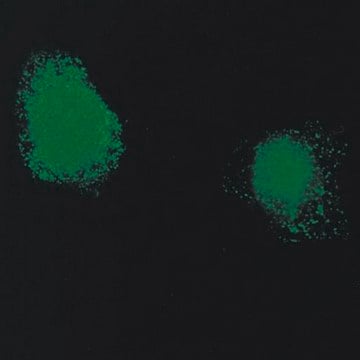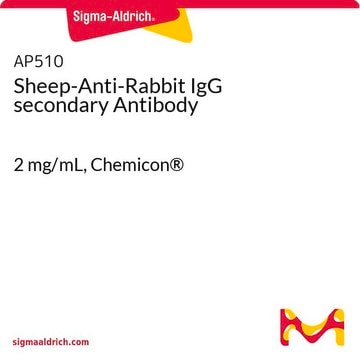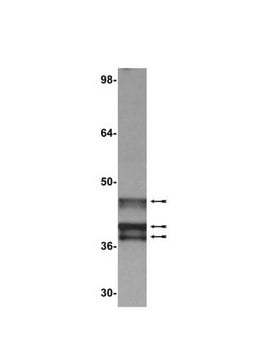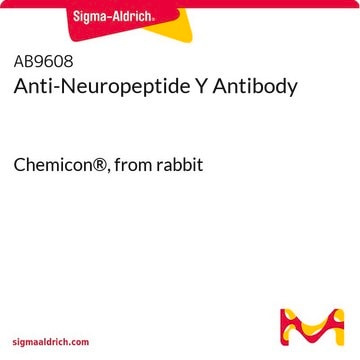Recommended Products
biological source
goat
Quality Level
antibody form
purified antibody
antibody product type
primary antibodies
clone
polyclonal
species reactivity
human
manufacturer/tradename
Chemicon®
technique(s)
ELISA: suitable
immunofluorescence: suitable
immunohistochemistry: suitable
western blot: suitable
shipped in
wet ice
Specificity
Adenovirus, hexon assembly. No cross-reactivity with Para 1-3, Influenza A & B or RSV. Non reactive with HEp-2 cells.
Immunogen
Hexon from adenovirus type 5.
Application
ELISA: >1:5,000
Fluorescence microscopy, indirect.
Immunoblotting: unboiled samples in 1mM DTT and 2% SDS only
Immunohistochemistry
Optimal working dilutions must be determined by end user
Fluorescence microscopy, indirect.
Immunoblotting: unboiled samples in 1mM DTT and 2% SDS only
Immunohistochemistry
Optimal working dilutions must be determined by end user
Research Category
Infectious Diseases
Infectious Diseases
Research Sub Category
Infectious Diseases - Viral
Infectious Diseases - Viral
This Anti-Adenovirus Antibody is validated for use in ELISA, IF, WB, IH for the detection of Adenovirus.
Physical form
Format: Purified
IgG fraction (>95% pure). In PBS (0.01 M, pH 7.2) with 0.1% sodium azide
Storage and Stability
Maintain at -20° in undiluted aliquots for up to 12 months after date of receipt. Avoid repeated freeze/thaw cycles.
Other Notes
Concentration: Please refer to the Certificate of Analysis for the lot-specific concentration.
Legal Information
CHEMICON is a registered trademark of Merck KGaA, Darmstadt, Germany
Disclaimer
Unless otherwise stated in our catalog or other company documentation accompanying the product(s), our products are intended for research use only and are not to be used for any other purpose, which includes but is not limited to, unauthorized commercial uses, in vitro diagnostic uses, ex vivo or in vivo therapeutic uses or any type of consumption or application to humans or animals.
Not finding the right product?
Try our Product Selector Tool.
Storage Class Code
12 - Non Combustible Liquids
WGK
WGK 2
Flash Point(F)
Not applicable
Flash Point(C)
Not applicable
Certificates of Analysis (COA)
Search for Certificates of Analysis (COA) by entering the products Lot/Batch Number. Lot and Batch Numbers can be found on a product’s label following the words ‘Lot’ or ‘Batch’.
Already Own This Product?
Find documentation for the products that you have recently purchased in the Document Library.
Highly efficient and carcinoma-specific adenoviral replication restricted by the EGP-2 promoter.
W M Gommans, P M J McLaughlin, J A C Schalk, G M M Groothuis, H J Haisma, M G Rots
Journal of Controlled Release : Official Journal of the Controlled Release Society null
M Verónica Lopez et al.
PloS one, 4(4), e5119-e5119 (2009-04-02)
The clinical efficacy of conditionally replicative oncolytic adenoviruses (CRAd) is still limited by the inefficient infection of the tumor mass. Since tumor growth is essentially the result of a continuous cross-talk between malignant and tumor-associated stromal cells, targeting both cell
Matthew Glen Robertson et al.
Molecular therapy oncolytics, 20, 659-668 (2021-04-06)
Encoding the sodium iodide symporter (NIS) by an adenovirus (Ad) is a promising strategy to facilitate non-invasive imaging and radiotherapy of pancreatic cancer. However, insufficient levels of NIS expression in tumor cells have limited its clinical translation. To optimize Ad-based
Lynette M Phillips et al.
Neuro-oncology, 23(11), 1911-1921 (2021-06-02)
Oncolytic adenoviruses are promising new treatments against solid tumors, particularly for glioblastoma (GBM), and preclinical models are required to evaluate the mechanisms of efficacy. However, due to the species selectivity of adenovirus, there is currently no single animal model that
J-W Choi et al.
Gene therapy, 20(9), 880-892 (2013-03-22)
Adenoviruses (Ad) have been investigated for their efficacy in reducing primary tumors after local intratumoral administration. Despite high Ad concentrations and repetitive administration, the therapeutic efficacy of Ad has been limited because of rapid dissemination of the Ad into the
Our team of scientists has experience in all areas of research including Life Science, Material Science, Chemical Synthesis, Chromatography, Analytical and many others.
Contact Technical Service




